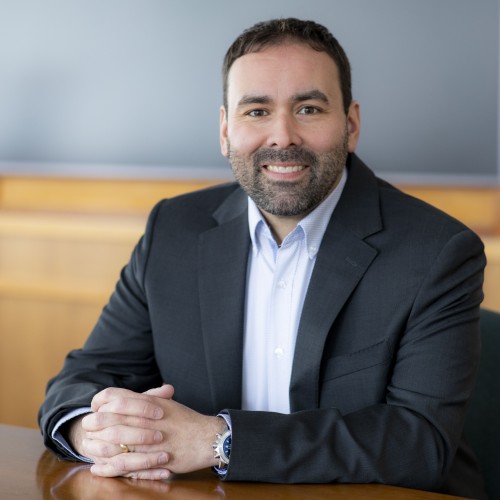Joshua Tuck, DO, MS, MBA, MHCDS

I have recently been named chief of surgery for my hospital. This promotion resulted directly from the personal leadership skills I have learned in the MHCDS program. I look forward to using the knowledge and skills obtained in the MHCDS program to help guide my organization through its transition towards launching a new ambulatory surgery center.
I am a board-certified orthopedic surgeon and subspecialty-certified sports medicine specialist caring for a wide variety of operative and nonoperative musculoskeletal diseases and injuries. I am also a Clinical Assistant Professor of Surgery & Orthopedics at the Lake Erie College of Osteopathic Medicine, Erie, PA. As chief of surgery, I am responsible for directing surgical services at Millcreek Community Hospital in Erie, PA. My responsibilities include general oversight of the department. This entails creating, updating, and implementing policies and procedures for the surgery service line. It also involves periodic performance reviews of the department’s surgeons and staff. When not at work, I enjoy spending time with my wife and son. We are outdoor enthusiasts and love to travel. As New Hampshire natives, we try to return to our home state whenever the opportunity arises.
Why did you decide to take the MHCDS program?
Although I had recently completed my MBA with a concentration in healthcare administration, I still felt that I could benefit from further education specific to the science of health care delivery. While the technical aspects of business were well presented in my MBA program, I had a desire to learn more about healthcare improvement and ways that I could enhance the quality of care provided by my institution and within my community. I had previously developed a major initiative within my healthcare system to address the challenges in our musculoskeletal referral process. While this quality improvement effort met with initial success, it became increasingly difficult for users to navigate and created unforeseen delays in patient care. The program was eventually dissolved. While disappointing, this experience helped me realize that I could benefit from further education specific to the work of health care improvement.
What has been the best part of the program for you – so far?
I have thoroughly enjoyed my time in the MHCDS program. The professors are genuinely engaged with the students and are passionate about their areas of expertise. They are also collectively committed to improving health care delivery. The program is structured to ensure every course is related to the next, so that the overall learning is successive and uniform. The result is an educational experience that is both relevant and immediately applicable. Material learned in a Sunday assignment is applied Monday morning in the office.
How have you used the MHCDS experience/skills/knowledge you have gained? Do you have a real-life example?
We had a guest presenter in our general management class this past Tuesday evening, Dr. Stephen Leffler, who is the president and COO of UVM Medical Center and an MHCDS alum. He discussed the crisis that his health system endured with their former CEO going to jail for fraud and the aftermath of their strained community relations. Dr. Leffler eventually took the helm and helped turn the health system around. He also navigated through other crises, such as a cyber attack that shut down the hospital's internet and communications for three weeks, and the infamous COVID ordeal. His leadership style is very hands-on, and he seems to inspire and invigorate his staff through his genuine actions. He told several stories highlighting the importance of meeting your employees where they are, establishing authentic bonds and creating credibility among your people. He gave a wonderful example of how he makes it a point to park a distance from the hospital regularly, so that he has to ride the bus to work like everybody else. These kinds of actions give him ground-level interactions with his staff, and no doubt build upon his positive and personable reputation. I took some inspiration from Dr. Leffler's presentation to work with me the following morning, when I asked for input from several members of our surgical staff regarding an upcoming policy change. They were pleasantly shocked that I was asking for their input, and enthusiastically provided several ideas that I had not previously considered. This experience reinforced the concepts that Dr. Leffler had just discussed with us the night before, and made the lesson even more relevant for me. Going forward, I will strive to seek input from staff and involve them more in our departmental decisions.
Is there anything else that you would tell a friend or colleague who was considering the MHCDS program?
I am thrilled with my decision to attend Dartmouth’s MHCDS Program. As expected, the course work has been relevant and applicable. I would highly recommend this program to anyone genuinely interested in improving health care delivery within their organization and community.